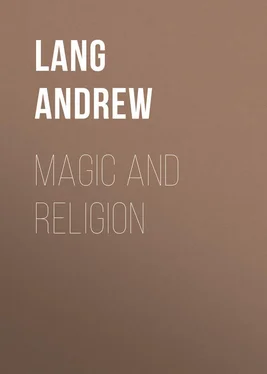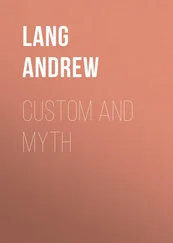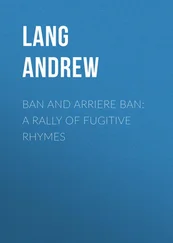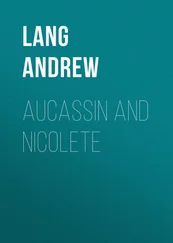Andrew Lang - Magic and Religion
Здесь есть возможность читать онлайн «Andrew Lang - Magic and Religion» — ознакомительный отрывок электронной книги совершенно бесплатно, а после прочтения отрывка купить полную версию. В некоторых случаях можно слушать аудио, скачать через торрент в формате fb2 и присутствует краткое содержание. Жанр: foreign_antique, foreign_prose, на английском языке. Описание произведения, (предисловие) а так же отзывы посетителей доступны на портале библиотеки ЛибКат.
- Название:Magic and Religion
- Автор:
- Жанр:
- Год:неизвестен
- ISBN:нет данных
- Рейтинг книги:4 / 5. Голосов: 1
-
Избранное:Добавить в избранное
- Отзывы:
-
Ваша оценка:
- 80
- 1
- 2
- 3
- 4
- 5
Magic and Religion: краткое содержание, описание и аннотация
Предлагаем к чтению аннотацию, описание, краткое содержание или предисловие (зависит от того, что написал сам автор книги «Magic and Religion»). Если вы не нашли необходимую информацию о книге — напишите в комментариях, мы постараемся отыскать её.
Magic and Religion — читать онлайн ознакомительный отрывок
Ниже представлен текст книги, разбитый по страницам. Система сохранения места последней прочитанной страницы, позволяет с удобством читать онлайн бесплатно книгу «Magic and Religion», без необходимости каждый раз заново искать на чём Вы остановились. Поставьте закладку, и сможете в любой момент перейти на страницу, на которой закончили чтение.
Интервал:
Закладка:
The scene is Central Australia, where 'the pitiless sun beats down for months together out of a blue and cloudless sky on the parched and gaping earth.' Consequently rain-making magic must perpetually prove a failure. Therefore, I presume, the Dieri have been driven into religion by discovering the fallacy of magic. This would be a logical argument, but Mr. Frazer's argument is the converse of what I suggest and contradicts his theory. He dubiously grants the existence of possible faint 'germs of religion' 'in the south-eastern parts of Australia, where the conditions of life in respect of climate, water, and vegetation are more favourable than elsewhere… It is worth observing that in the same regions which thus exhibit the germs of religion, the organisation of society and the family has also made the greatest advance. The cause is probably the same in both cases – namely, a more plentiful supply of food due to the greater fertility of the soil.' 91 91 G. B . i. 72, note.
Now, according to Mr. Frazer's whole argument, the confessed failure of magic is the origin of religion. 92 92 G. B . ii. 75-80. The hypothesis is offered with all due diffidence.
But in Central Australia, where magic notoriously fails most conspicuously to supply water and vegetation, magic flourishes to the entire exclusion of religion, except among the Dieri. On the other hand, in South-Eastern Australia, where magic, if practised, is abundantly rewarded by more water and more vegetation, there these proofs of the success of magic are 'probably the cause' of the germs of religion. But, by Mr. Frazer's hypothesis, what must be the apparent success of magic in securing 'a more plentiful supply of food' ought to encourage the belief in magic, and prevent religion from even germinating. On the other hand, the successful result of magic (for to what else can a people of sorcerers attribute the better food supply?) has been 'probably the cause' of the first germs of religion. How can these things be?
All this time one tribe of Central Australia, the Arunta, remains resolutely godless 'in spite of all temptations to join denominations' of a religious character. For the Arunta live in the worst country, the most rainless, and therefore their magic is most manifestly a failure. Yet, unlike the natives of South-Eastern Australia (where magic is most successful), the Arunta cling to magic, and have developed no religion. If so, as of all rain-making magic theirs is about the most unsuccessful, they must be very stupid, or they would detect the failure, and fly to religion, 'a quiet haven after a tempestuous voyage.' The Arunta are very far from stupid; they have the most complete and adequate of savage metaphysics. If, then, they have not approached superior powers, in face of the failure of their magic, it may be that they have tried and discarded religion. 'Religion for the women and the children, magic for men' appears to be the Arunta motto: not so very uncivilised! This I suggest because Mr. Frazer tells us that at the initiatory rites of the Arunta 'the women and children believe that the roaring noise' of the wooden slat, tied to a string and swung about, is 'the voice of the great spirit Twanyirika.' 93 93 G. B. iii. 424.
A great spirit (above all if spelled with capital letters) is rather a religious conception. 'This spirit, the women are told, lives in wild and inaccessible regions… Both uninitiated youths and women are taught to believe in the existence of Twanyirika.' So write Messrs. Spencer and Gillen, our only sources. 94 94 Natives of Central Australia , p. 246, note 1.
A brief note is all that these inquirers give in their copious book to the great spirit. 'This belief,' they say, 'is fundamentally the same as that found in all Australian tribes.' Now in the tribes reported on by Mr. Howitt, the spirit whose voice is the sound of the slat or bull roarer called the tundun , and by other names, is the son or other deputy of Baiame, or some such powerful good being, Mungan-ngaur, Pirnmeheal, Bunjil, Noorele, or by whatever style he may be called. One of his duties is to superintend the Bora, or mysteries of the tribes. The Wiraijuri believe that their type of Twanyirika was destroyed, for misconduct, by his superior, Baiame. This sinful great spirit was called Daramulun, but in other tribes Daramulun is apparently the superior, and goes on existing. He is, says Mr. Howitt, 'the Great Master,' 'the Father,' the sky dweller, the institutor of society, the power whose voice 'calls to the rain to fall and make the grass green.' He is the moral being for whom 'the boys are made so that Daramulun likes them' – a process involving cries of nga ('good'), so says Mr. Howitt. His attributes and powers (where he is supreme) 'are precisely those of Baiame,' who, by Mr. Ridley and many others, is spoken of as a maker, if I may not say creator. It was in 1854, two years before publishing his 'Gurre Kamilaroi' (in which 'Baiame' was used for 'God'), that Mr. Ridley asked a Kamilaroi man, 'Do you know Baiame?' He said, Kamil zaia zummi Baiame, zaia winuzgulda ('I have not seen Baiame; I have heard, or perceived him. They hear him in the thunder'). Among this tribe Daramulun was not the superior; he was 'author of disease and medical skill, of mischief and wisdom also; he appears in the form of a serpent at their assemblies,' like Asclepius and the American Hobamok. 95 95 J. A. I ., 1872, pp. 268, 269. Lang's Queensland , pp. 444, 445. Winslow, in Arber's Captain Smith , p. 768.
Though Mr. Ridley is a missionary, I venture to cite him, because his evidence goes back nearly fifty years, to a time when the blacks had less contact with Europeans. Moreover, Mr. Ridley is corroborated by Mr. Howitt and other laymen, while Mr. Frazer even prefers the evidence of a German missionary to that of Mr. Gason, a lay Englishman of the greatest experience. Mr. Howitt finds, among the Kurnai, Tundun as the patron of the mysteries and the bull roarer, like Twanyirika. In Mr. Manning's tribe 96 96 See 'The Theory of Loan-Gods,' supra .
the same rôle is taken by Moodgeegally, under the control of Boyma.
We have thus five or six parallels to the Twanyirika of the godless Arunta, and all are subordinate to a higher power. If then, as Messrs. Spencer and Gillen tell us, the belief in the Arunta Twanyirika, the great spirit, 'is fundamentally the same as that found in all the Australian tribes,' Twanyirika ought to have a much more powerful benevolent superior. In that case the Arunta would as Clough says. If so, as they do not propitiate him, they did not conceive him as a partner in the game of Do ut des . But our only witnesses, Messrs. Spencer and Gillen, are extremely reticent about Twanyirika. Nothing is said about his having a superior, and I assume that he has none. It seems to follow that he is a mere Mumbo Jumbo, or bogle, devised by the men to keep the women and children in order.
Incline to think there is a god,
Or something very like one,
But in South-Eastern Australia (if I may trust Mr. Howitt's evidence, to which Mr. Frazer does not here allude) the counterpart of Twanyirika is a mere servant of a much higher being, everywhere called by names meaning 'our father.' Therefore either 'our father' Baiame, Mungan-ngaur, and the rest, have been developed out of a sportive bugbear like Twanyirika, or Twanyirika (if he really has no superior) is a rudimentary survival of a belief like that in Mungan-ngaur, and his subordinate, Tundun. In the former case Twanyirika, a germ of the more advanced religion of South-Eastern Australia, was not invented as a power behind nature, who might be useful if propitiated, as in Mr. Frazer's theory. In the latter case the Arunta do not represent man prior to religion (as Mr. Frazer holds), but man who has cast off religion. But Mr. Frazer does not seem to notice this dilemma.
Читать дальшеИнтервал:
Закладка:
Похожие книги на «Magic and Religion»
Представляем Вашему вниманию похожие книги на «Magic and Religion» списком для выбора. Мы отобрали схожую по названию и смыслу литературу в надежде предоставить читателям больше вариантов отыскать новые, интересные, ещё непрочитанные произведения.
Обсуждение, отзывы о книге «Magic and Religion» и просто собственные мнения читателей. Оставьте ваши комментарии, напишите, что Вы думаете о произведении, его смысле или главных героях. Укажите что конкретно понравилось, а что нет, и почему Вы так считаете.












